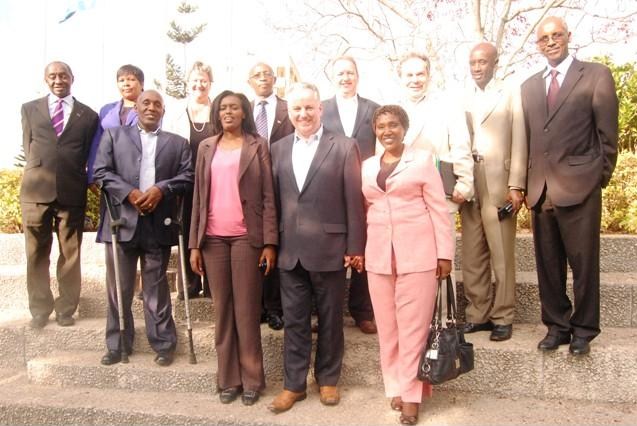

APPG Great Lakes visit to DR Congo and Rwanda
A delegation of UK parliamentarians led by Lord McConnell met President Kabila, Prime Minister Ponyo and other Democratic Republic of the Congo (DRC) officials, as well as UK representatives and UN officials, in the course of their delegation visit. DRC leaders expressed optimism with regards to the new Peace, Security and Cooperation Framework for the Democratic Republic of the Congo and the region (PSCF). They believed the framework offered a unique window of opportunity and provided for a new level of engagement from the international community and key regional players which has been absent for the last decade. Members of the National Episcopal Conference of Congo however felt that without consistent pressure from the international community on all parties to the Agreement, the PSCF would fail.
Discussions on the Peace Agreement also focussed on the new emphasis being placed on the implementation of significant new peace building and reforms efforts in the DRC. The Acting Force Commander of the UN peacekeeping mission in the DRC (MONUSCO) Maj. Gen. Adrian Foster, outlining the key peace-enforcing mandate of the newly-deployed UN Force Intervention Brigade, assured the delegation that troops would be appropriately trained with a key focus on protection of civilians and in full respect of humanitarian considerations and human rights law.
The DRC Prime Minister highlighted progress achieved in the last few months, especially in terms of investment in the social sector, improved good governance, progress in the fight against corruption and greater transparency in the mining sector. President Kabila acknowledged, however, that the DRC needed to improve key reforms in the security and infrastructure sectors.
UN officials noted genuine efforts and progress made by the government, for instance in terms of ensuring an end to impunity, but noted the significant challenges still standing in the way of providing adequate protection and provision of basic services to the population. UN officials encouraged the UK and other donor countries to focus their aid programming on capacity-building and good governance.
UN officials also highlighted the importance of the International Security and Stabilisation Support Strategy which is funding stabilisation activities in conflict-affected areas of eastern DRC. Following a major strategic review, it had been concluded that the programme should set out a meaningful set of tasks for the DRC Government to complete and hold them accountable to carrying out these tasks.
Civil society organisations insisted on the importance for local and provincial elections to be both organised within a short time frame but also appropriately prepared for, and for the newly-reformed National Electoral Commission’s work to remain completely impartial, transparent and independent from the ruling administration.
Meetings in Kigali focused on assessing the current political climate in Rwanda, in particular human rights and space for political dialogue, including in the lead-up to the September 2013 legislative elections. Rwandan parliamentarians from the government coalition and the parliamentary opposition explained that the history of the country required a distinctive political system, based on power-sharing and resolution of differences through dialogue and consensus, while human rights organisation and some political opposition members deplored the fact that the government restricted freedom of speech, assembly and association and the absence of political space as a result.
Speakers and Members from both parliaments were very keen to create and maintain strong links with British parliamentarians and more specifically expressed a strong wish of developing (for DRC) and continuing (for Rwanda) capacity-building programmes between theirs and the UK Parliament.













